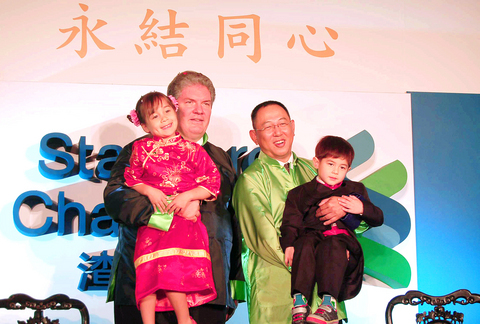Following its acquisition late last year, Hsinchu International Bank (
The name change will be submitted for approval at Hsinchu International's annual general meeting on May 21.
Hsinchu International's incumbent chairman and president Wu Chih-wei (

PHOTO: YANG YA-MIN, TAIPEI TIMES
James McCabe, current chief executive officer (CEO) of Standard Chartered's Taiwan branch, would also retain his title in the merged bank and oversee daily operations, Wu said yesterday at a press briefing.
The new name represents the combination of Hsinchu International's strong regional branch presence with Standard Chartered's international network and financial services to link Taiwanese customers to the rest of the world, Kai Nargolwala, executive director of Standard Chartered group, said in a statement.
The takeover marks the nation's first foreign buyout of a local lender, boosting the British banking group's number of local outlets from three to 86. The move has also driven other international banks in the country, including Citibank, to seek expansion through mergers and acquisitions.
Standard Chartered expects to see rising profitability in the wake of the merger.
"The combination of [the two banks'] business will result in greater profits and broader growth momentum," McCabe said, while declining to elaborate on forecast growth figures.
Standard Chartered incurred a loss of NT$3.3 billion last year in the wake of the consumer credit abuse problem. This compared with profits of NT$1.15 billion in 2005, the Financial Supervisory Commission's data showed.
Hsinchu International posted a huge loss of NT$5.45 billion last year, compared with profits of NT$3.26 billion a year earlier, the commission's data showed.

Taiwan’s foreign exchange reserves hit a record high at the end of last month, surpassing the US$600 billion mark for the first time, the central bank said yesterday. Last month, the country’s foreign exchange reserves rose US$5.51 billion from a month earlier to reach US$602.94 billion due to an increase in returns from the central bank’s portfolio management, the movement of other foreign currencies in the portfolio against the US dollar and the bank’s efforts to smooth the volatility of the New Taiwan dollar. Department of Foreign Exchange Director-General Eugene Tsai (蔡炯民)said a rate cut cycle launched by the US Federal Reserve

Handset camera lens maker Largan Precision Co (大立光) on Sunday reported a 6.71 percent year-on-year decline in revenue for the third quarter, despite revenue last month hitting the highest level in 11 months. Third-quarter revenue was NT$17.68 billion (US$581.2 million), compared with NT$18.95 billion a year earlier, the company said in a statement. The figure was in line with Yuanta Securities Investment Consulting Co’s (元大投顧) forecast of NT$17.9 billion, but missed the market consensus estimate of NT$18.97 billion. The third-quarter revenue was a 51.44 percent increase from NT$11.67 billion in the second quarter, as the quarter is usually the peak

The US government on Wednesday sanctioned more than two dozen companies in China, Turkey and the United Arab Emirates, including offshoots of a US chip firm, accusing the businesses of providing illicit support to Iran’s military or proxies. The US Department of Commerce included two subsidiaries of US-based chip distributor Arrow Electronics Inc (艾睿電子) on its so-called entity list published on the federal register for facilitating purchases by Iran’s proxies of US tech. Arrow spokesman John Hourigan said that the subsidiaries have been operating in full compliance with US export control regulations and his company is discussing with the US Bureau of

Pegatron Corp (和碩), a key assembler of Apple Inc’s iPhones, on Thursday reported a 12.3 percent year-on-year decline in revenue for last quarter to NT$257.86 billion (US$8.44 billion), but it expects revenue to improve in the second half on traditional holiday demand. The fourth quarter is usually the peak season for its communications products, a company official said on condition of anonymity. As Apple released its new iPhone 17 series early last month, sales in the communications segment rose sequentially last month, the official said. Shipments to Apple have been stable and in line with earlier expectations, they said. Pegatron shipped 2.4 million notebook